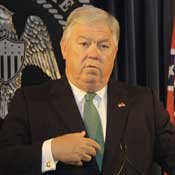Mississippi Gov. Haley Barbour shifted his support for a $20 billion escrow fund that BP agreed to set up to compensate Gulf State victims filing claims for losses due to the massive oil spill in the Gulf of Mexico.
The Associated Press reported June 16 that Barbour had doubts about whether the federal government should have pushed oil company BP into creating a $20 billion escrow account to provide compensatory damage to Gulf state residents. He also told FOX News in an interview that same day that creating the account would make it less likely for BP to be able to pay the claims.
"I do worry that this idea of making them make a huge escrow fund is going to make it less likely that they'll pay for everything," Barbour told FOX News. "They need their capital to drill wells. They need their capital to produce income so that they can pay that income to our citizens in Alabama, Mississippi, Florida, Louisiana and to pay for all the damages done."
Barbour's concerns represented a less dramatic reaction than that of U.S. Rep. Joe Barton, R-Texas, who apologized profusely to BP Chief Executive Officer Tony Hayward during a congressional hearing last week and called the $20 billion escrow account orchestrated by the White House "a shakedown."
The Texas Republican retracted his comment hours after a meeting with House Minority Leader John Boehner, R-Ohio, and House Minority Whip Eric Cantor, R-Va.
Boehner, Cantor and U.S. Rep. Mike Pence, R-Ind., issued a June 17 statement calling the oil spill in the Gulf "this nation's largest natural disaster" (despite the fact that the disaster is entirely man-made) and that stopping the leak and cleaning up the region is a "top priority." They also called Barton's statements "wrong."
"BP itself has acknowledged that responsibility for the economic damages lies with them and has offered an initial pledge of $20 billion dollars for that purpose," the congressmen said in a statement.
Barbour, by Friday, was ready to accept the deal with the same open arms of Louisiana Republican Gov. Bobby Jindal.
"The law is that BP is the responsible party in any damage done to someone because of the oil spill. Whether it's loss to income as an employee or as a business or because of injury, BP is suppose to pay it," Barbour told reporters. "We expect them to pay it and we'll demand them to pay it, and BP said they intend to pay all legitimate claims."
Barbour also dismissed his earlier fears of the $20 billion escrow account hurting BP, saying that the company is responsible for more than $20 billion if damages surpass that figure. Barbour said the mechanics behind the $20 billion escrow account allows the oil company to spread the payment over the course of years so that the company could handle the expenses and still meet its own costs.
"We don't take that $20 billion out at once," Barbour said. "It's paid in increments, otherwise they could never pay our claims."
Barbour praised compensatory czar Kenneth Feinberg, who the White House and BP agreed would manage the $20 billion escrow pay-outs in Mississippi. Feinberg, 2004 National Law Journal "Lawyer of the Year," was in charge of the federal September 11th Victim Compensation Fund following the Sept. 11, 2001, terrorist attacks and maintained a similar fund in Louisiana after Hurricane Katrina.
Feinberg said he would oversee "an independent claims facility" designed to improve upon the claims process BP has instituted since the April destruction culminating in a continuing geyser of oil beneath the Gulf of Mexico.
The governor said BP is also responsible for lost state and local tax revenue as a result of the faltering tourism and fishing industry. Connie Rockco, president of the Harrison County Board of Supervisors, told the Jackson Free Press that her district has opened multiple bond issues to fund development in Harrison County, and will suffer if taxes generated from hotel fees decrease in the wake of the spill.
Rockco, however, said that local governments should also have ready access to BP money to attempt their own oil-prevention methods and protect their shores.
"This is like Katrina in slow motion," Rockco said. "Local government should have access to money so we can try ideas to keep the oil out of our water. There are oil-collecting mesh and materials that can separate the oil from the water, but paying for these experimental gadgets costs money—and we're not getting any BP funds to try anything. Meanwhile, the oil is slowly rolling in."


